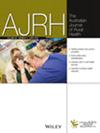Provision of Evidence-Informed Psychological Interventions Following the Queensland (Australia) 2010–11 Floods and Cyclones; the Barriers and Successes
Abstract
Objective
The study assessed the impact on clinicians' ‘perception of skills’ in postdisaster evidence-informed care (EIC) following participation in an online training programme implemented following the Queensland floods and cyclones of 2010–11, clinician confidence to provide EIC, the frequency clinicians used EIC and barriers to providing postdisaster specialist mental health care.
Design
Clinician perception of pre and posttraining skills, confidence in providing therapies such as trauma-focused cognitive behaviour therapy (TF-CBT), frequency of therapies provided and clinician perception of barriers to the programme were assessed quantitatively and qualitatively.
Participants and Setting
Clinical staff (n = 60) employed by the 2010–11 postdisaster mental health programme participated in an online survey conducted over the last 12 weeks of 2012. After the programme concluded an independent audit of the clinical record of mental health clients treated by clinicians employed in the specialist mental health programme was undertaken.
Main Outcome Measure(s)
Perception of clinical skills in various EIC modalities was completed pre and posttraining. Confidence to provide a treatment was rated on a five-point scale. The clinical record audit identified the treatments provided to clients. Barriers to programme delivery were rated on a five-point scale, with qualitative feedback highlighting programme concerns.
Results
Posttraining clinicians perceived skills in TF-CBT (p < 0.0001), cognitive behaviour therapy (CBT) (p < 0.001) and exposure therapy (p < 0.001) had improved. Following training, clinicians described themselves as moderately to extremely confident in implementing TF-CBT (87%), exposure therapy (80%) and skills for psychological recovery (SPR) (88%). Clinical records analysis indicates that 25% of cases received no TF-CBT, while 43% received one to five sessions. Barriers to care included a lack of cross-service relationships. Recommendations focused on training and early commencement of intervention programmes.
Conclusion
The study echoes the findings of the 2020 Australian Bushfire Royal Commission recommendations that highlighted a need for clinician training in postdisaster EIC and the availability of clinicians with specialised postdisaster mental health skills.

 求助内容:
求助内容: 应助结果提醒方式:
应助结果提醒方式:


